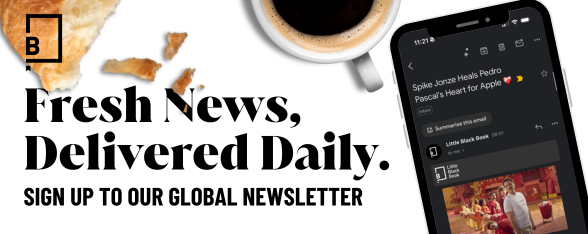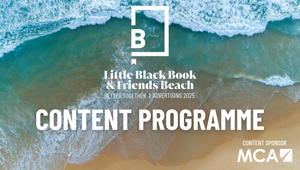
How HEINEKEN's Craft Beer Speaks (and Doesn’t Mumble)

"We don't sell beer - we sell emotional sociability," a marketing executive at HEINEKEN was once quoted as saying. The marketing industry has celebrated the global drinks company’s passion for brand building for many years. In 2014 HEINEKEN was even named Cannes Lions’ Marketer of the year.
But the company founded in Amsterdam by Gerard Adriaan Heineken wants us to know that they also still care about the beer itself. And this is perhaps no more evident than in its push in the past year into what it calls the ‘Craft & Variety’ part of its brand portfolio, which includes zany California brewers Lagunitas, the centuries-old tradition of Belgian abbey beer Affligem, and the fruity flavours of Brussels’ Mort Subite. Aside from those key brands, the company has been getting involved in other craft breweries around the world, like Beavertown of Tottenham, beloved by an ever-growing group of craft beer drinkers across London and the UK.
But how can craft beer - a culture that’s rooted in small, independent breweries unrestrained by large corporate structures - sit within a huge multinational like HEINEKEN? LBB’s Alex Reeves shared a beer with Walter Drenth, senior global director international brands and craft, to talk through this recent focus.
LBB> A recent report said 43% of people believe craft beers have to be made by a small brewer and only 2% think a beer made by a multinational corporation deserves the craft label. How do you overcome those challenges when marketing craft beers?
Walter> To be honest it doesn’t preoccupy my mind a lot. I think what is important is that there’s a lot of respect. For example, we acquired Lagunitas and we joined forces [a process completed in 2017]. We help each other, but we also leave them alone.
They’re part of our team but we leave them with their own culture, their own innovation strategy, developing their own beers. We very much respect how they have built a whole brand and culture and that is something I think we need to nurture. It’s great for them. They are partnering with a company like HEINEKEN that gives them a route to market in different markets. Simply put, they use us as a route to enter the UK, France, Italy and perhaps even more markets.
We also learn. For us [as HEINEKEN] it’s also a journey. If there’s mutual respect we keep it as it is and we breed that.
The only challenge is how to do that. If you go to [Lagunitas’ birthplace] Petaluma and you meet Tony [Magee, the brewery’s founder] and go to the brewery it’s such a special atmosphere. The big challenge is to transfer that atmosphere into the UK, the Netherlands, Spain etc.
Everyone who works on Lagunitas is trained by Lagunitas, in the Lagunitas way. That’s something we’re protecting and nurturing. There’s a lot of respect for that.
LBB> Is that why you’ve put a lot of focus on physical spaces for craft brands like Lagunitas?
Walter> One of the reasons [for the taproom] is we believe the brand needs a home. And the home is being also designed and set up by the Lagunitas team. We have the first in Amsterdam. That is to bring the culture to life, to bring people in and let them experience the beers, the people and everything. Hopefully there’s more to come.
LBB> You’ve also got involved in a lot of smaller craft brands. I live in North London so one of my favourites is Tottenham’s Beavertown. Their taproom at the new White Hart Lane stadium looks gorgeous!
Walter> The same principle applies there. We have a minority stake in the business [HEINEKEN acquired a 49% stake last summer]. There’s a lot of mutual respect. Beavertown is Beavertown. It’s a beautiful brand.
LBB> How you market these kinds of craft brands? Is it about traditional above the line stuff or do you take a different approach, like the taprooms?
Walter> I think when we enter a market with a Lagunitas or an Affligem, we start small and we start in trade. There’s no above-the-line. We know that our people, our outlets are telling the stories - let the beer speak for itself. Then there’s a lot of sharing of those stories. We start ‘incubating’, which is basically moving to the right outlets and making sure it’s all there - that the beer is absolutely fresh and high quality, the service is there in the right glass and everything. It starts from the basics - it’s essential for building these craft brands, going out from there, wider and wider. Let consumers experience it. Let them be our investors in the brand.
I really love the line that Lagunitas uses. They say ‘Beer Speaks, People Mumble.’ Let people rattle on, it’s all about the beer.
LBB> HEINEKEN's been building its focus in ‘Craft & Variety’ beers. What does 'craft' mean to you?
Walter> The challenge here is that in different cultures there are different views on craft beer. In the US they have a different view on how they define craft versus Europe or Asia. But I think what is common across craft line extensions [where an existing brand like Birra Moretti will experiment with craft variations] or international craft global brands, it’s a passion for quality, a passion for brewing. Yes, a lot of craft has been developed over the last few years, so craft beer is quite young [for Heieneken], relatively to other beers. But also there is craftsmanship from the past. Affligem is almost 1,000 years old and the Italian line extensions in Birra Moretti Regionale is also, for me, part of craft.
What we also do in some markets, like Portugal and Spain, is take old brands and revive them, give them new life. They were already part of the portfolio but not really active. With innovation around brewing and different beer styles, these brands are revived.
LBB> What are the similarities between marketing your craft brands and the more mainstream HEINEKEN brands? Is there a thread of continuity?
Walter> I think that’s one level up. It’s talking about the values we have as a company for beer. It’s very much in the DNA of the company, generations back, this passion for quality. Enjoyment is also part of it. The focus we have for beer.
HEINEKEN, as a company, we educate people in terms of how to bring these brands to people. It’s the people inside as well, it’s still very much a family culture, family owned with family values. You feel that continuity in the business. It’s obviously a big corporation. But I think everybody gets educated and gets into that passion for passion for quality and the passion for beer.
LBB> Does that influence the brands that HEINEKEN chooses to take on board as part of your portfolio?
Walter> We want to offer to our operating companies a variety of brands. Variety in terms of proposition, positioning, taste, provenance. We see in markets there is a higher demand for different tastes, different brand stories, different provenances. We wanted to offer a wider portfolio to make sure that we have enough to help build these premium portfolios in markets. It’s not a two- or three-brand game. You could also do that, but we decided to have a wider portfolio, to give markets the choice to pick the right one.
LBB> We keep hearing that Generation Z doesn't drink nearly as much as previous generations. How does this challenge fit into how HEINEKEN's brands are marketing themselves more broadly? Does the focus on quality over quantity of craft fit into that?
Walter> I think the solution is again to offer the variety. You see that their repertoires are growing. They’re interested in many more beverages and tastes. One of our key areas is also low or no alcohol. It goes from Birra Moretti Zero but also to malt beverages that are big in Africa - not beer but malt with vitamins in it. Then you have the radlers [shandy], so there’s a whole range of low and no alcohol propositions. That’s very much aimed at this generation too. The young generation is accepting this, which is different from a couple of years ago.
Their repertoires are pretty wide depending on their location. That’s the beauty of this specific portfolio. You go from 0% to 6.8% and everything in between. So there’s something for everyone.
On the flipside you see so-called older generations that are big into Heineken 0.0, but it depends on the occasion. I think that’s a good thing.















